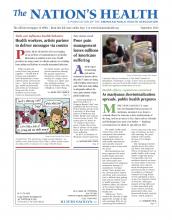Snoring can be a loud byproduct of sleep. But snoring may do more than disturb peace and quiet for your family members or significant others — it may be disturbing your health.
Snoring can indicate difficulty breathing because your airway is obstructed, says Michael Twery, PhD, director of the National Heart Lung and Blood Institute’s National Center on Sleep Disorders Research.

Photo by Digitalskillet, courtesy of iStockphoto
“You’re not able to get all the air in each breath that you need,” Twery says. “As the severity of snoring increases, it progresses to a medical condition sometimes referred to as sleep-disordered breathing, or sleep apnea.”
Being unable to get enough air in each breath while snoring also means you’re struggling to get oxygen you need for vital organs like your brain, heart, kidneys and liver, Twery says. Snorting or gasping during sleep may signal you’re not getting enough air, which disturbs your sleep and leads to excessive sleepiness during the day, according to the Centers for Disease Control and Prevention.
Risk factors for sleep apnea that result from snoring include being overweight, being over age 40, male and having a family history of sleep apnea, according to the National Institutes of Health. However, loud chronic snoring and sleep apnea can occur in people of all shapes and sizes. Small children, for example, may develop sleep apnea if they have enlarged tonsil tissues, NIH says. Other risk factors include having a large neck, tongue or tonsils, as well as a small jawbone, and an obstruction in your nasal passage because of issues such as allergies, NIH says.
While the changes to your body during sleep-disordered breathing may be small, frequently disturbed sleep alters your body metabolism and over time contributes to the risk of chronic diseases, Twery says.
“Scientists have measured increases in the risk of heart disease, of stroke, diabetes and other disorders in people with untreated sleep-disordered breathing, sometimes indicated by the sound of frequent, loud snoring,” Twery says.
If you’re someone who has constantly dealt with the side effects of loud snoring, there are ways you can turn down the volume. Twery says a first step for seeking help with excessive sleepiness and loud frequent snoring is to discuss your symptoms with a physician or sleep specialist who can evaluate the need for treatment in relation to your overall health.
“It’s the physician who is in the best position to understand how this is affecting the individual self...and also to understand whether snoring might represent a more serious breathing condition where there’s insufficient breathing during sleep and if it’s a condition that needs further testing or treatment,” Twery says.
However, Twery says research has shown that loud chronic snoring and sleep apnea can get better for some people with weight loss. That means adopting healthier habits such as better diet and exercise. Other steps you can take are reducing your alcohol intake and quitting smoking, NIH says.
“Sometimes as we gain body weight, the thickness of the airway may increase because of fat accumulating in the muscle of the airway,” Twery says. “That effectively narrows the airway and reduces its mechanical strength increasing the likelihood of airway obstruction.”
Another solution is to use a continuous positive airway pressure, or CPAP, machine as you sleep. The machine senses your breathing and sends enough air through a mask to prevent airway obstruction and quiet snoring, he says.
Twery says that some people may not like wearing a mask or feel uncomfortable breathing with a machine. That’s why it’s important to discuss with your health provider about what the best option for you is and if there are alternatives, he says.
Snoring effects can mess up your day
Your performance at school and your job may suffer if untreated sleep- disordered breathing makes it difficult to get a full night’s rest.
You also might endanger others’ lives, especially if you’re not well rested before tasks such as driving a vehicle, Twery says.
For more tips on snoring and sleep apnea, visit www.nhlbi.nih.gov
- Copyright The Nation’s Health, American Public Health Association









